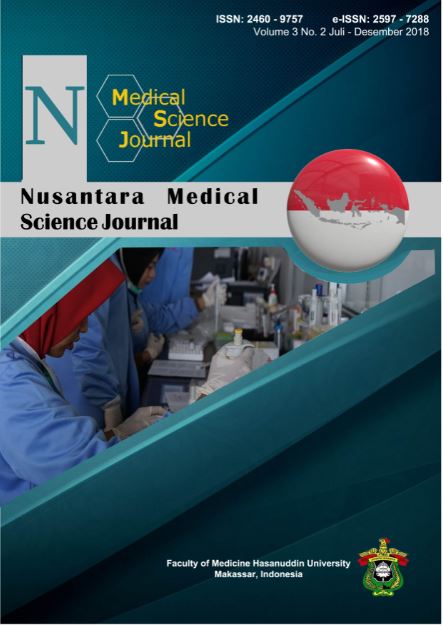KNOWLEDGE OF DIABETIC RETINOPATHY AMONGST TYPE II DIABETES MELLITUS PATIENTS IN DR. WAHIDIN SUDIROHUSODO HOSPITAL
DOI:
https://doi.org/10.20956/nmsj.v3i2.5777Keywords:
diabetic retinopathy, level of knowledge, DR screening, type 2 DMAbstract
Introduction: Diabetic retinopathy (DR) is the leading cause of blindness that rises significantly each year along with the increasing diabetic population. It is estimated that 1 out of 3 people with diabetes will suffer from DR and 1 in 10 of them will be threatened with blindness. The main problem on DR management is the delay in diagnosis since most patients in the early stages do not experience visual impairment.Methods: Descriptive research was conducted over three months on 175 patients diagnosed with type 2 Diabetes Mellitus (DM) within the Internal Medicine Clinic at Hasanuddin University Hospital. Self-administered questionnaires were used to assess knowledge of DR amongst the diabetic patients.Results: The level of DR knowledge among type 2 DM was split into three categories. The level of knowledge on DM complication was within the good category for 109 patients (61.6%), whilst the level of knowledge on DR screening was within the the sufficient category for 150 patients (84.7%) and knowledge on DR management was within the good category for 98 patients (55.4%). Although the level of knowledge was categorized good for the majority of respondents, the remaining 45 (25.4%) respondents had never done DR screening, and most patients (57.1%) believed that DM patients tend not to screen due to the lack of knowledge about DR.Conclusion: In general, patients with type 2 DM have a good level of knowledge about diabetic retinopathy.
References
Kemenkes RI. (2014). Situasi dan Analisis Diabetes. Infodatin. Pusat Data dan Informasi Kementerian Kesehatan RI
PERKENI. (2015). Konsensus dan Pencegahan Diabetes Melitus Tipe 2 di Indonesia
World Health Organisation. (2016). Global Report on Diabetes
International Diabetes Federation. (2017) IDF Diabetes Atlas. 8th edn. Brussels, Belgium: International Diabetes Federation
Nick Kourgialis - Hellen Keller International. Vision Atlas. Available at: http://atlas.iapb.org/ vision-trends/diabetic-retinopathy
Yau JWY, Rogers SL, Kawasaki R, Lamoureux EL, Kowalski JW, Bek T, et al. (2012) Global prevalence and major risk factors of diabetic retinopathy. Diabetes Care. ;35(3):556–64
Nursyamsi,Muhiddin Habibah S, Ichsan AM, (2017), Prevalensi Retinopati Diabetik Yang Mengancam Penglihatan dan Tidak Terdiagnosa Di RSUP Dr. Wahidin Sudirohusodo ,JST Kesehatan, April, Vol. 7 No. 2 : 185 – 190
Notoatmodjo S. (2010) Metodologi Penelitian Kesehatan. Jakarta: Rineka Cipta
Srinivasan., et al, (2017) Diabetes and Diabetic Retinopathy: Knowledge, Attitude, Practice (KAP) among Diabetic Patients in A Tertiary Eye Care Centre, J Clin Diagn Res. Jul; 11(7): NC01–NC07.
Al zarea BK, (2016) Knowledge, Attitude and Practice of Diabetic Retinopathy amongst the Diabetic Patients of AlJouf and Hail Province of Saudi Arabia, J Clin Diagn Res. May; 10(5): NC05–NC08.
Ovenseri-Ogbomo GO, Abokyi S, Koffuor GA, Abokyi E. (2013) Knowledge of diabetes and its associated ocular manifestations by diabetic patients: A study at Korle-Bu Teaching Hospital, Ghana. Niger Med J.;54(4):217–23.
American Diabetes Association. (2011) Diagnosis And Classification Of Diabetes Mellitus. Diabetes Care
American Academy of Ophthalmology. (2017) Preferred Practice Pattern Diabetic Retinopathy-Updated.









